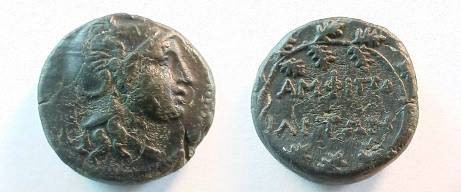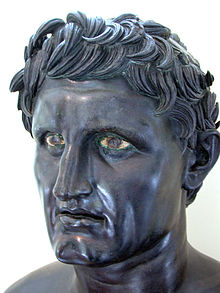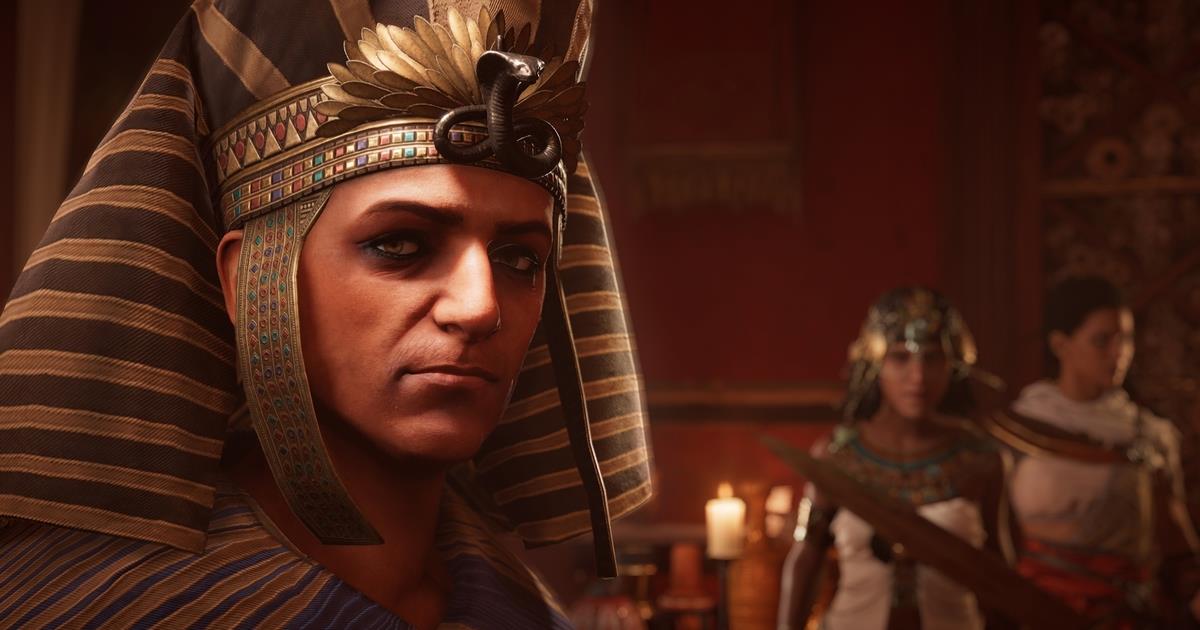HIS GENERALS
Hephaestion (Ancient Greek: Ἡφαιστίων Hephaistíon; c. 356 BC – 324 BC), son of Amyntor, was an ancient Macedonian nobleman and a general in the army of Alexander the Great. He was "... by far the dearest of all the king's friends; he had been brought up with Alexander and shared all his secrets."[3] This friendship lasted throughout their lives, and was compared, by others as well as themselves, to that of Achilles andPatroclus.
Antigonus I Monophthalmus
Antigonus I Monophthalmus (Ancient Greek: Ἀντίγονος ὁ Μονόφθαλμος, translit. Antigonos ho Monophthalmos, Antigonus the One-eyed, 382–301 BC), son of Philip from Elimeia, was a Macedonian nobleman, general, and satrap under Alexander the Great. During his early life he served under Philip II, and he was a major figure in the Wars of the Diadochi after Alexander's death, declaring himself king in 306 BC and establishing the Antigonid dynasty.
Antipater
Antipater (/ænˈtɪpətər/; Greek: Ἀντίπατρος Antipatros; c. 397 BC – 319 BC) was a Macedonian general and statesman under kings Philip II of Macedon and Alexander the Great, and father of King Cassander.[1] In 320 BC, he became regent of all of Alexander the Great's Empire
The fight for succession
The new regent, Perdiccas, left Antipater in control of Greece. Antipater faced revolts in Athens, Aetolia, and Thessaly that made up the Lamian War, in which southern Greeks attempted to re-assert their independence. He defeated them at the Battle of Crannon in 322 BC, with Craterus' help, and broke up the rebellion. As part of this he imposed oligarchy upon Athens and demanded the surrender of Demosthenes, who committed suicide to escape capture. Later in the same year Antipater and Craterus were engaged in a war against the Aetolians when he received the news from Antigonus in Asia Minor that Perdiccas contemplated making himself outright ruler of the empire. Antipater and Craterus accordingly concluded peace with the Aetolians and went to war against Perdiccas, allying themselves with Ptolemy, the satrap of Egypt. Antipater crossed over to Asia in 321 BC. While still in Syria, he received information that Perdiccas had been murdered by his own soldiers. Craterus fell in battle against Eumenes (Diodorus xviii. 25-39).[3]
Apollodorus of Amphipolis

Apollodorus (Greek: Ἀπολλόδωρος) from Amphipolis was one of the cavalry generals of Alexander the Great, who commanded the force Alexander left behind with the Babylonian governor Mazaeus.[1][unreliable source?] He was entrusted in 331 BCE, together with Menes of Pella, with the administration of Babylon and of all the satrapies as far as Cilicia. Alexander also gave them 1000 talents to collect as many troops as they could
Arcesilaus (satrap)

Following the death of Alexander, Arcesilaus was allotted Mesopotamia in the Partition of Babylon in 323 BCE, which he may have administered since as early as 331 BCE.[1] He supported Perdiccas, and may have been deposed or forced to flee his satrapy for this reason.[1] Nothing concrete is known about him after 323 BCE, but it is also believed that he may have been an opponent of Seleucus.[2] In any case, by thePartition of Triparadisus in 320 BCE, Arcesilaus had fallen from influence, as he was replaced in his satrapy by Amphimachus
Archon of Pella
Archon (Ancient Greek: Ἄρχων; died 321 BC) was a Pellaean, appointed satrap of Babylonia after the death of Alexander the Great in 323 BC.[1] He is probably the same as the son of Cleinias mentioned in the Indian expedition of Alexander.[2] He perished in 321 in a fight againstDocimus.[3] An inscription in Delphi shows that Archon had taken part in both the Isthmian and Pythian Games of 333-332, winning some horse-races.
Calas (general)

..
Calas or Callas (Greek Κάλας or Κάλλας; lived 4th century BC) was an ancient Greek, son of Harpalus of Elimiotis and first cousin toAntigonus, king of Asia, who held a command in the army which Philip II sent into Anatolia under Parmenion and Attalus, 336 BC, to further his cause among the Greek cities there. In 335 BC Calas was defeated in a battle in the Troad by Memnon of Rhodes, but took refuge in Rhaeteum.[1] At the Battle of the Granicus in 334 BC he led the Thessalian cavalry in Alexander's army, and was appointed by him in the same year to the satrapy of the Lesser or Hellespontine Phrygia, to which Paphlagonia was soon after added.[2] Excluding a failed attempt to conquerBithynia[3], we do not hear of Calas: it would seem, however, that he died before the treason and flight of his father in 325, as we know fromArrian that Demarchus succeeded him in the satrapy of the Hellespontine Phrygia during Alexander's life-timeMenander (general)

Menander (Greek: Μένανδρος; fl. 4th century BC) was an officer in the service of Alexander the Great. He was one of those called etairoi, but he held the command of a body of mercenaries. He was appointed by Alexander to the government of Lydia, during the settlement of the affairs of Asia made by Alexander when at Tyre (331 BC). Menander appears to have remained at that post until the year 323 BC, when he was commissioned to lead a reinforcement of troops to Alexander at Babylon — he arrived there just before the king's last illness.[1] In the division of the provinces, after the death of Alexander, Menander received his former government of Lydia, of which he was quick to take possession
Ophellas


Ptolemy (son of Seleucus)


ALEXANDRIA OF EGYPT , CITY GIVEN TO PTOLEMY BY ALEXANDER
Ptolemy (Greek: Πτολεμαῖος); died 333 BC) son of Seleucus from Orestis or Tymphaia,[1] was one of the select officers called Somatophylaces, or guards of the king's person; he combined with that distinguished post the command of one of the divisions of the phalanx. Ptolemy was from an upper noble family. He was lately married when he accompanied Alexander on his expedition to Asia, 334 BC, on which account he was selected by the king to command the body of Macedonians, who were allowed to return home for the winter at the end of the first campaign. In the following spring he rejoined Alexander at Gordium, with the troops under his command, accompanied by fresh reinforcements. At the Battle of Issus (333 BC) his division of the phalanx was one of those opposed to the Greek mercenaries under Darius III, and upon which the real brunt of the action consequently devolved; and he himself fell in the conflict, after displaying the utmost valou==========================================================
https://en.m.wikipedia.org/wiki/Category:Generals_of_Alexander_the_Great
==========================================================


No comments:
Post a Comment